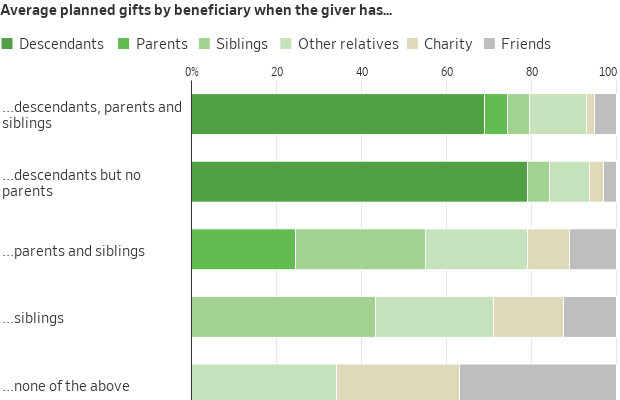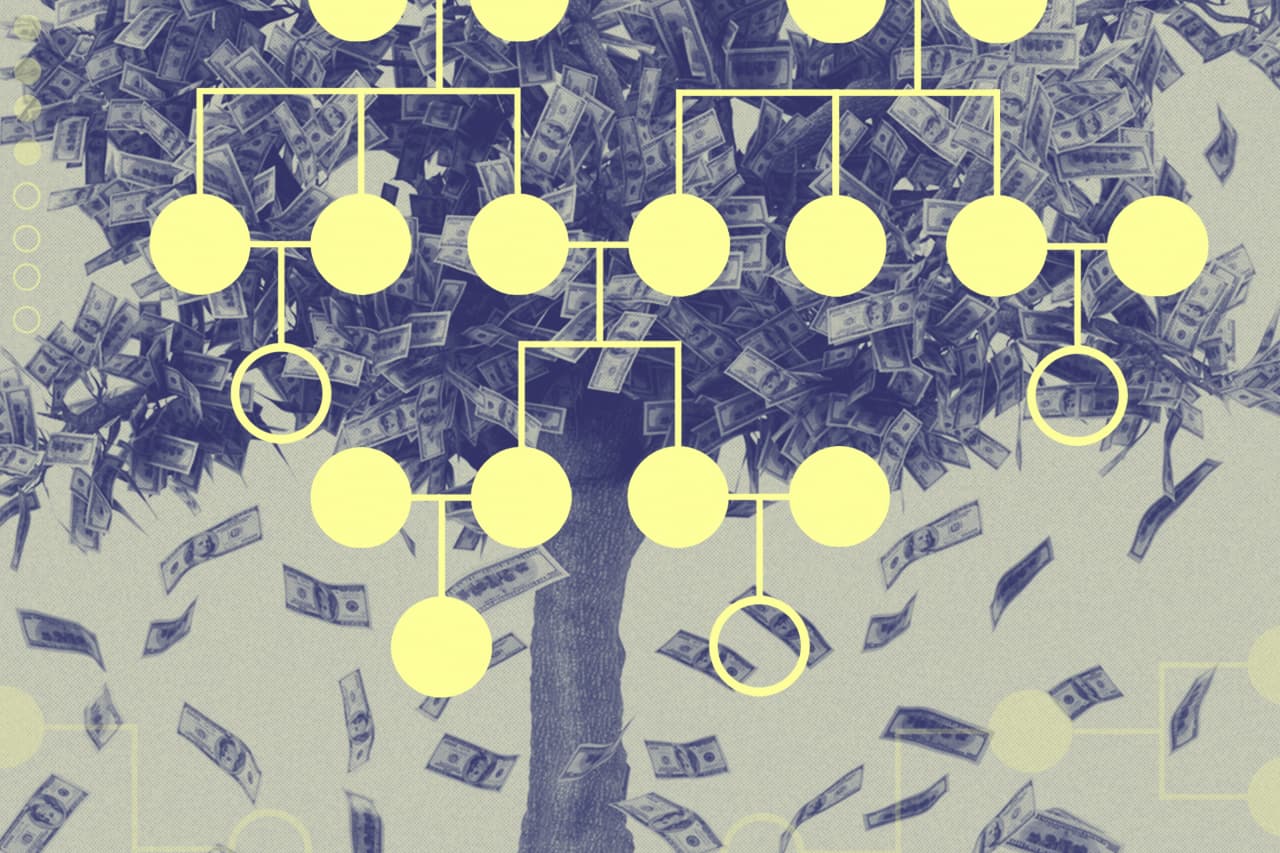People Without Kids Are Leaving Money to Surprised Heirs
The bequests benefit charities, distant relatives and even pets
Charities, distant relatives and even pets are benefiting from surprise inheritances. They can thank people without children.
Not having children is becoming more common, both among millennials and older people. A July Pew Research Center analysis found that 20% of U.S. adults age 50 and older hadn’t had children.
And many of these people don’t have wills. An AARP survey found half of childless people age 50-plus who live alone have a will, compared with 57% of others that age. Those without wills have less control over what happens to their money, which often ends up in the hands of people who don’t expect it.
This phenomenon of a surprise inheritance is common enough that it has a name: the laughing heir .
“All they do is get the money and go, ‘Ah ha ha, look at that,’ ” said Michael Ettinger , an estate lawyer in New York.
Kelley Gilpin McKeig, a 64-year-old healthcare-industry consultant in Ridgefield, Wash., received a phone call several years ago saying her cousin Nick Caldwell left behind money in a savings account. They hadn’t been in touch for 20 years.
“I thought it was a scam,” she said. “Nobody else in our family had heard that he had passed.”
She hunted down his death certificate and a news article and learned he had died about a year and a half before in a workplace accident.
Caldwell, who was in his 50s, had died without a will. His estate was split among cousins and an uncle. It took about two years for the money to be distributed because of the paperwork and court approval involved. Gilpin McKeig’s share was $2,300.
Afterward, she updated her will to make sure what she has doesn’t go to “just anybody down the line, or cousins I don’t care about.”
Who inherits
There are trillions of dollars at stake as baby boomers age.
Most people leave their money to spouses and children when they die. A 2021 analysis of Federal Reserve survey data found that 82% of heirs’ inheritances came from parents.

People with no children say they want to leave a greater share of their estates to charity, friends and extended family , according to research by two Yale law professors that surveyed 9,000 U.S. adults.
Rebecca Fornwalt, a 33-year-old writer, created a trust after landing a book deal. While her heirs are her parents, her backup heirs include her sister and about a half-dozen close friends. She set aside $15,000 for the care of each of her two dogs.
Susan Lassiter-Lyons , a financial coach in Florence, Ariz., said one childless client is leaving equal interests in her home to her two nephews. Another is leaving her home to a man she has been friends with for a long time.
“She broke his heart years ago and she feels guilted into leaving him property,” Lassiter-Lyons said.
A client who is a former escort estranged from her family is leaving her estate to two friends and to charity.
Lassiter-Lyons, who doesn’t have children, set up a trust for her two dogs should she and her wife die. The pet guardian, her wife’s sister, would live in their house while taking care of the dogs. When the dogs die, she inherits the house.
In the Yale study, people without descendants—children or grandchildren—intended to give 10% of their estates to charity, on average, more than triple the intended amount of those with descendants.
The Jewish Community Foundation of Los Angeles, which manages $1.3 billion of assets, a few years ago added an “heirless donors” section to its website that profiles donors and talks about building a legacy.
“Fifteen years ago, we never talked about child-free donors at all,” said Lew Groner , the foundation’s vice president for marketing.
In the absence of a will, heirs are determined by state law . Assets can wind up in the state’s hands. In New York, for example, $240 million in unclaimed funds over the past 10 years has arrived from estates of the deceased, not including real estate, according to the state comptroller’s office. In California, it is $54.3 million.
Hard questions
Financial advisers say a far bigger concern than who gets what is making sure there is enough money and support for a comfortable old age, because clients without children can’t call on them for help.
“I hope there is something left to leave,” said Stephanie Maxfield, a 43-year-old therapist in southern Colorado. “But if there isn’t, I think that’s OK, too.”
She said she would like to leave something to her partner’s nieces and nephews, as well as animal shelters and domestic-violence shelters. Her best friend is a beneficiary.
Choosing an estate executor and who would handle money and health decisions on your behalf can be difficult when you don’t have children, financial advisers say. Using a promised inheritance as a reward for taking care of you when you are older isn’t a good solution, said Jay Zigmont , an investment adviser focused on childless people.
“Unfortunately, it is relatively common to see family members who are in the will decide to opt for cheaper medical care (or similar decisions) in order to protect what they will be inheriting,” he said in an email.
Kirsten Tompkins, who is from Birmingham, U.K., and works in consulting, along with her husband divided their estate among their dozen nieces and nephews.
Choosing heirs was the easy part. What is hard is figuring out whom to ask for help as she and her husband get older, she said.
“A lot of us are at an age where we are playing that role for our parents,” the 50-year-old said, referring to tasks such as providing tech support and taking parents to medical appointments. “Who is going to do that for us?”
 Copyright 2020, Dow Jones & Company, Inc. All Rights Reserved Worldwide. LEARN MORE
Copyright 2020, Dow Jones & Company, Inc. All Rights Reserved Worldwide. LEARN MORE
A divide has opened in the tech job market between those with artificial-intelligence skills and everyone else.
A 30-metre masterpiece unveiled in Monaco brings Lamborghini’s supercar drama to the high seas, powered by 7,600 horsepower and unmistakable Italian design.
A 30-metre masterpiece unveiled in Monaco brings Lamborghini’s supercar drama to the high seas, powered by 7,600 horsepower and unmistakable Italian design.
When Lamborghini takes to the water, subtlety isn’t on the agenda. Unveiled at the Monaco Yacht Show, the Tecnomar for Lamborghini 101FT is a 30-metre superyacht that fuses Italian automotive theatre with cutting-edge naval engineering.
The model builds on the collaboration that began in 2020 with the Tecnomar for Lamborghini 63, a sell-out success that celebrated the marque’s founding year.
This new flagship pushes the partnership between Automobili Lamborghini and The Italian Sea Group to a grander scale, designed to deliver the same adrenaline rush at sea that drivers expect behind the wheel.
“The Tecnomar for Lamborghini 101FT redefines the concept of nautical luxury,” said Stephan Winkelmann, Chairman and CEO of Automobili Lamborghini.
“It is not only a yacht, but an affirmation of Italian excellence. The Italian Sea Group and Automobili Lamborghini share an exclusive clientele who are passionate about beauty, technology, and extreme performance.”
Design cues are unmistakably Lamborghini. The yacht’s sharp exterior lines echo the Fenomeno supercar revealed at Monterey Car Week, complete with Giallo Crius launch livery and signature Y-shaped lighting.
Inside, the cockpit and lounges mirror the DNA of Sant’Agata supercars through hexagonal motifs, sculptural seating and dramatic contrasts. With accommodation for up to nine guests and three crew cabins, indulgence meets practicality on every deck.
Performance is equally uncompromising. Three MTU 16V 2000 M96L engines and triple surface propellers generate a combined 7,600 horsepower, driving the yacht to 45 knots at full throttle, with a cruising speed of 35 knots. Two 35 kW generators provide additional efficiency and reliability, ensuring the yacht’s power matches its presence.
Mitja Borkert, Lamborghini’s Design Director, said: “With the Tecnomar for Lamborghini 101FT, we aimed to create a product that embodies the main design characteristics of our super sports cars. All the details, from the exterior to the colour, to the interior areas, recall and are inspired by Lamborghini’s DNA.”
Presented in scale at Monaco, the definitive Tecnomar for Lamborghini 101FT is scheduled to hit the water at the end of 2027. For those who demand their indulgence measured not only in metres but in knots, this is Lamborghini’s most extravagant expression yet.
In the remote waters of Indonesia’s Anambas Islands, Bawah Reserve is redefining what it means to blend barefoot luxury with environmental stewardship.
When the Writers Festival was called off and the skies refused to clear, one weekend away turned into a rare lesson in slowing down, ice baths included.





























